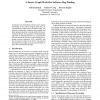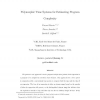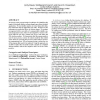115
click to vote
CACM
2010
15 years 2 months ago
2010
Static program analysis techniques cannot know certain values, such as the value of user input or network state, at analysis time. While such unknown values need to be treated as ...
IJCAI
2007
15 years 3 months ago
2007
Automatic tools for finding software errors require knowledge of the rules a program must obey, or “specifications,” before they can identify bugs. We present a method that ...
106
click to vote
SAS
1991
Springer
15 years 5 months ago
1991
Springer
We present a new approach to static program analysis that permits each expression in a program to be assigned an execution time estimate. Our approach uses a time system in conjun...
144
click to vote
MICRO
1993
IEEE
15 years 6 months ago
1993
IEEE
Compile-time code transformations which expose instruction-level parallelism (ILP) typically take into account the constraints imposed by all execution scenarios in the program. H...
117
click to vote
RTCSA
2000
IEEE
15 years 6 months ago
2000
IEEE
As a starting point for static program analysis a control flow graph (CFG) is needed. If only the binary executable is available, this CFG has to be reconstructed from sequences ...
PASTE
2010
ACM
15 years 7 months ago
2010
ACM
Inaccurate documentation can mislead programmers and cause software to fail in unexpected ways. We examine mismatches between documented and actual error codes returned by 42 Linu...
144
click to vote
ASPLOS
2004
ACM
15 years 7 months ago
2004
ACM
Embedded software must meet conflicting requirements such as being highly reliable, running on resource-constrained platforms, and being developed rapidly. Static program analysi...
119
click to vote
CAV
2005
Springer
15 years 7 months ago
2005
Springer
Automaton-based static program analysis has proved to be an effective tool for bug finding. Current tools generally re-analyze a program from scratch in response to a change in t...
141
Voted
ICSE
2008
IEEE-ACM
16 years 2 months ago
2008
IEEE-ACM
We propose static program analysis techniques for identifying the impact of relational database schema changes upon object-oriented applications. We use dataflow analysis to extra...



